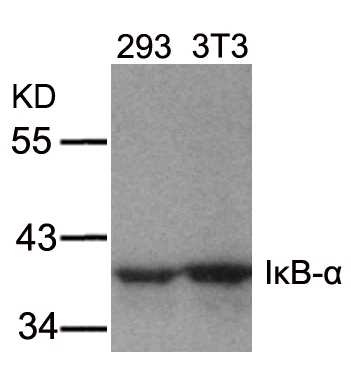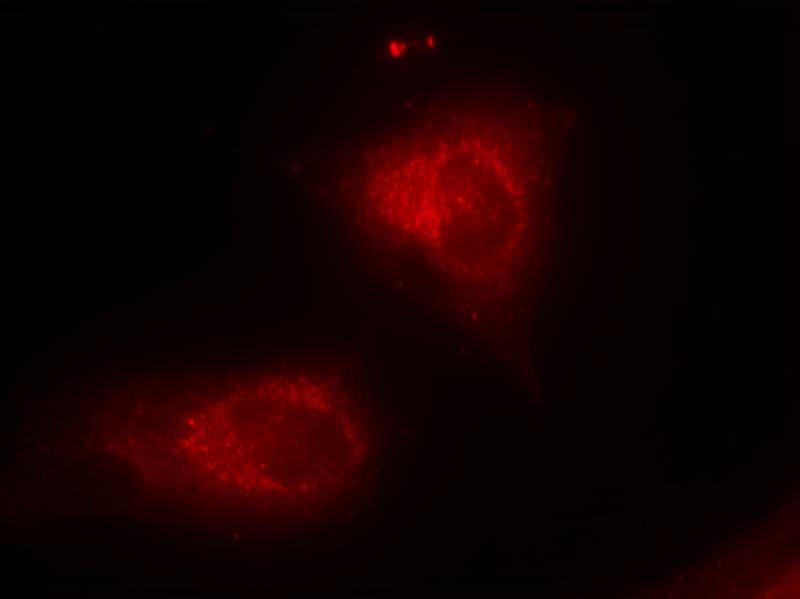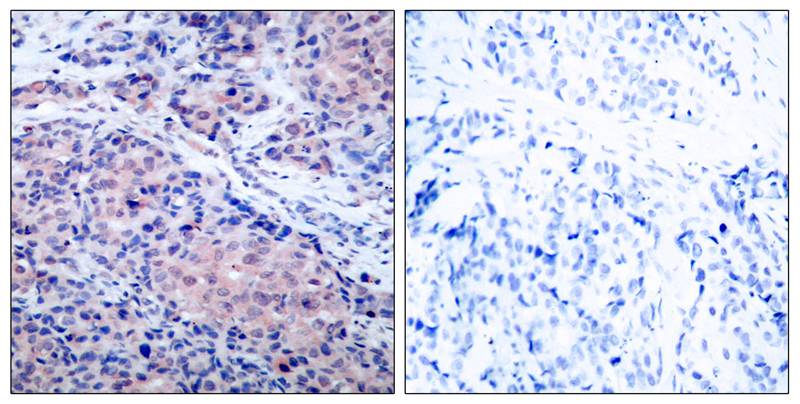


| WB | 咨询技术 | Human,Mouse,Rat |
| IF | 咨询技术 | Human,Mouse,Rat |
| IHC | 1/50-1/100 | Human,Mouse,Rat |
| ICC | 1/100-1/200 | Human,Mouse,Rat |
| FCM | 咨询技术 | Human,Mouse,Rat |
| Elisa | 咨询技术 | Human,Mouse,Rat |
| Aliases | I-kappa-B-alpha; IKBA; NF-kappaB inhibitor alpha; NFKBI; NFKBIA |
| Entrez GeneID | 4792; |
| WB Predicted band size | 39kDa |
| Host/Isotype | Rabbit IgG |
| Antibody Type | Primary antibody |
| Storage | Store at 4°C short term. Aliquot and store at -20°C long term. Avoid freeze/thaw cycles. |
| Species Reactivity | Human,Mouse |
| Immunogen | Peptide sequence around aa.30~34/34~38 (H-D-S-G-L- D-S -M-K) derived from Human IkB-a. |
| Formulation | Purified antibody in PBS with 0.05% sodium azide. |
+ +
1. **"Control of IκB-α Proteolysis by Site-Specific, Signal-Induced Phosphorylation"**
- **Authors**: Brown, K., Gerstberger, S., Carlson, L., Franzoso, G., & Siebenlist, U.
- **摘要**: 研究揭示了炎症因子(如TNF-α)诱导的IκB-α在丝氨酸32/36位点的磷酸化是其被蛋白酶体降解的关键步骤,并验证了针对该磷酸化位点的抗体在Western blot检测中的应用。
2. **"IKK-1 and IKK-2: Cytokine-Activated IκB Kinases Essential for NF-κB Activation"**
- **Authors**: Mercurio, F., Zhu, H., Murray, B.W., Shevchenko, A., et al.
- **摘要**: 鉴定IKK复合物(IKK-1/IKK-2)为直接磷酸化IκB-α(Ser32/36)的激酶,通过特异性抗体证实其在NF-κB激活中的核心作用,为炎症和癌症机制提供依据。
3. **"Phosphorylation of Human IκB-α on Serines 32 and 36 Controls IκB-α Proteolysis and NF-κB Activation"**
- **Authors**: Traenckner, E.B., Pahl, H.L., Henkel, T., Schmidt, K.N., et al.
- **摘要**: 通过突变分析和磷酸化特异性抗体(Ab-32/36)证明,IκB-α的Ser32/36磷酸化是响应外界刺激(如LPS)后NF-κB核转位的必要条件。
4. **"The NF-κB Activation Pathway: A Paradigm in Information Transfer from Membrane to Nucleus"**
- **Authors**: Thanos, D., & Maniatis, T.
- **摘要**: 综述NF-κB信号通路,强调IκB-α磷酸化(通过Ab-32/36检测)在信号传递中的枢纽作用,并讨论其在基因转录调控中的生物学意义。
这些文献均聚焦于IκB-α磷酸化(Ser32/36)的机制及其在NF-κB通路中的功能,相关抗体被用于关键实验验证。
The IkB-α (Ab-32/36) antibody is a critical tool for studying the regulation of the NF-κB signaling pathway, which plays a central role in immune responses, inflammation, and apoptosis. IkB-α (Inhibitor of κB-α) is a member of the IkB family that binds to NF-κB transcription factors in the cytoplasm, preventing their nuclear translocation and activation of target genes. Upon stimulation by cytokines, pathogens, or stress signals, IkB-α undergoes phosphorylation at specific serine residues (Ser32 and Ser36) by the IKK (IκB kinase) complex. This phosphorylation marks IkB-α for ubiquitination and subsequent degradation via the proteasome, thereby releasing NF-κB to enter the nucleus and initiate gene transcription.
The IkB-α (Ab-32/36) antibody specifically detects IkB-α phosphorylated at Ser32 and Ser36. making it a valuable reagent for investigating the activation status of the NF-κB pathway. It is widely used in techniques such as Western blotting, immunoprecipitation, and immunofluorescence to assess phosphorylation-dependent IkB-α degradation in response to stimuli like TNF-α, IL-1β, or LPS. Researchers employ this antibody in studies of inflammatory diseases, cancer, and immune disorders, where dysregulated NF-κB activity is often implicated. Its specificity for the phosphorylated form ensures accurate detection of pathway activation, though validation with appropriate controls (e.g., kinase inhibitors or siRNA) is recommended to confirm signal specificity. Proper storage conditions (-20°C, avoiding freeze-thaw cycles) are essential to maintain antibody performance.
×